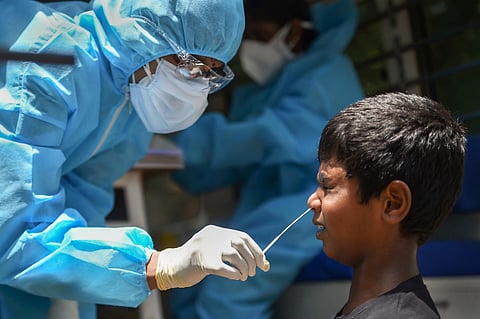

KOCHI: All vulnerable asymptomatic individuals admitted at hospitals for various treatments can be tested for COVID-19 using rapid antigen detection kits, says ICMR. While this test has been accepted as a pre-surgical procedure across India now, it was being prescribed only in some states or as part of individual hospital policy earlier. The Kerala government has expressed its willingness to opt for the new test, experts say testing all asymptomatic patients in hospitals is not feasible.
"However, if tested in cluster containment zones in the state, the results can be helpful. Antigen testing cannot be a replacement for RT-PCR, but it can be used as a back-up and as part of the surveillance mechanism," said Dr Joseph K, consultant, Internal Medicine and Diabetology at VPS Lakeshore. When elective surgeries restarted, many major hospitals in the state made Covid test mandatory even for those undergoing even minor surgeries.
"Even before the ICMR made it mandatory, the state government had laid down guidelines that all surgeries including minor ones must be performed after the person is subjected to the Covid test. Otherwise, the entire medical team and staff conducting the surgery will be under threat, so we cannot take chances," said Dr Sanil Kumar, a urologist based in Kochi.
The Standard Q COVID-19 Ag rapid antigen detection kit, approved by ICMR, is developed by South Korea-based SD Biosensor. It is known to be cheap and quick with results. According to the ICMR, the rapid antigen detection test is conducted on the nasal swab sample and it checks for the presence of antigens or foreign substances which trigger an immune response in people.
The test can be used as a rapid point-of-care test to determine whether a person has or has had the infection, in a setting outside of the conventional laboratory.
"The tests can be cheaper -- the ICMR has capped the price at Rs 450 -- and Delhi has started this testing. The test results arrive in just 30 minutes as compared to the RT-PCR which takes up to four hours. Its actual worth can be known only after its application in real-life scenarios," said a physician working at a major private hospital in Kochi who did not want to be named.
Negative result not conclusive
However, the ICMR also says that suspected individuals who test negative for Covid-19 in rapid antigen test should be definitely subjected to RT-PCR test subsequently to rule out infection, whereas a positive test should be considered as a true positive and does not need reconfirmation by the RT-PCR test.
As the rapid antigen test has low sensitivity, it is likely to miss a significant proportion of patients with the disease. On the other hand, it has very high specificity and can effectively confirm the disease in the patient.
"There is no absolute test, it is all based on some probabilities and statistics. When the sensitivity is less, that means chances of false negatives are more. Therefore, it depends on for what purpose the kit is being used. If it is for surveillance, then we can go by this, but when it comes to treatment, it may not be a right indication," said a member of the state expert committee on Covid-19.